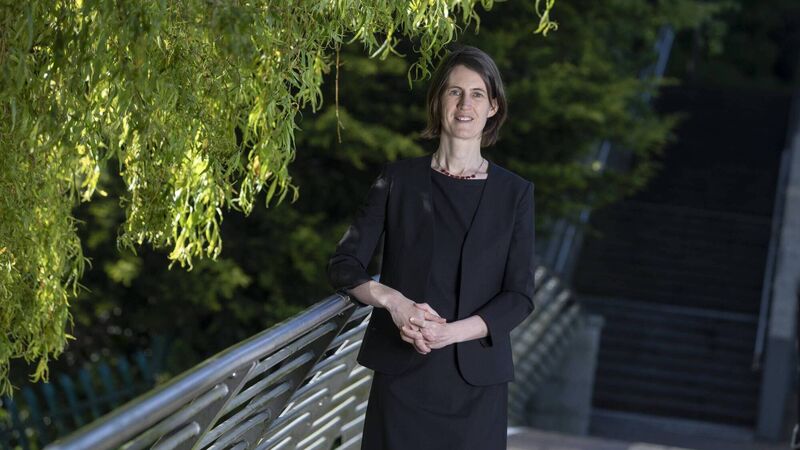"Women with cancer now live longer, and want best health"

Prof Roisin Connolly, consultant in medical oncology at CUH, says CUH is leading research into how women can best be supported to deal with difficult side-effects arising from their cancer treatment.
You're a woman who has recently faced a shock cancer diagnosis — perhaps breast, cervical or endometrial cancer. You’ve endured a harrowing treatment regime and you’ve come through it — surgery, chemo and radiotherapy.
You’re out the other end — except you don’t feel anything like you did before this whole ordeal started. You’ve maybe got lymphoedema, or are chronically fatigued or you’re troubled by incontinence. Perhaps you’re terrified the cancer will recur, or finding practical tasks insurmountable — like trying to care for young children when you’re feeling so not yourself.
The Linking You to Support & Advice (LYSA) study at Cork University Hospital (CUH) is part of the Irish Cancer Society’s Women’s Health Initiative (WHI). It is researching how women can best be supported to deal with difficult side-effects arising from their cancer treatment.
Indeed, this stage of the cancer experience — after acute phase of treatment has been completed — has traditionally been an under-appreciated aspect of the cancer journey, says an Irish Cancer Society spokesperson.
The WHI has research sites across Dublin and Cork, and the Cork-based LYSA arm of the initiative is led by principal investigator Professor Roisín Connolly, medical oncologist at CUH and Chair in Cancer Research at UCC, along with co-principal investigator Professor Josephine Hegarty, head of UCC’s School of Nursing and Midwifery.
LYSA is recruiting 200 selected patients referred through CUH and cancer support services in the region, with 100 taking part in the innovative survivorship model, and a control arm of 100 patients who receive routine surveillance. This will enable the study team to compare this new model of survivorship care to that currently in place for patients. It will also provide evidence around the feasibility and effectiveness of the model with a view to potential further rollout in future.
Patients recruited to LYSA — who have completed their primary cancer therapy — get access to a nurse-led, in-hospital survivorship clinic. They receive both in-person and virtual follow-up consultations. These consults provide them with tailored advice on a range of topics dealing with their symptoms, nutrition and self-care for a full year. It is the first time this model has been tried in Ireland.
“Ultimately, we want to see if this sort of aggressive management of symptoms — where a close eye is kept on the women and interventions are provided — improves outcomes after 12 months. We anticipate if they have a nurse-led, dedicated check-up and intervention they will do better,” says Professor Connolly.
Women recruited onto LYSA include those who are starting hormone therapy after their breast cancer treatment, and women who’ve been treated for gynaecological cancers.
At the outset, all the women — regardless of whether they’re in the trial or control group — will have a consultation with the nurse and with the dietician. Already, 110 women have been enrolled in LYSA.
“In April, we’ll see some of the first women reach the one-year mark,” confirms Professor Connolly, who says all women must have completed their year before findings are published.
LYSA — which receives major funding from Irish Cancer Society, as well as additional funding from Breakthrough Cancer Research — has been very favourably received, she reports.
“Doctors are delighted to send patients to a clinic, where at minimum they get early education about the cancer treatments they’ve received and their diet, as well as resources they might find helpful in general.”
When selected for the survivorship clinic, women fill out a questionnaire every two months, indicating if/what problems are occurring for them. “A message about such problems goes to the nurse who contacts them and who then recommends interventions,” explains Professor Connolly.
When it comes to lingering post-treatment side-effects, pain and fatigue are common, but women also experience social and emotional problems.
“What we hear a lot is that women have fears — about the future, about how long the cancer will be managed, whether they’re going to die from this cancer. We’re also hearing a lot lately about the impact of it all on their partner and children. So then it’s about giving them the tools to discuss cancer with their children, for example.”
Other symptoms affect the woman’s sexual life. “Changes in libido or symptoms like vaginal dryness can be side-effects of treatment. Psychological aspects come into it too — women can have concerns about their appearance, whether they’re attractive to their partners, for example if they’ve had breast cancer surgery.”
Professor Connolly says the beauty of LYSA is that, because the clinic is nurse-led, women are more likely to confide issues and worries to the nurse. “They feel they can bring things up better in a nurse-led clinic because it’s less busy and the nurse is asking them direct questions.”
According to Professor Connolly, the National Cancer Control Programme estimates that four percent of the population are cancer survivors. And this number is predicted to double over the next 25 years — making it all the more critical that supports are put in place for those living with cancer and beyond.
With current advanced treatments for some cancer types — in particular immunotherapy or targeted therapies — it’s becoming increasingly common to find women living with cancer, almost as a chronic disease.
"We do find more and more situations where people are living way beyond what they would have in the past, so it becomes about living their lives the best way they can. Women like these are thinking ‘I want what will optimise my health’,” says Professor Connolly who hopes LYSA will be part of a bigger initiative in the South, where the learning from the study can be built upon.
“It would be good to see something in the metastatic breast cancer space, which would be a whole different initiative with a different funding profile. We’re hoping in Cork we can find the money to have these expanded choices and services,” says Professor Connolly, who sees WHI kick-starting a whole drive in the South, which will be really important and beneficial for the patient.
“We need to build on what has started with LYSA, to put such supports in place for all types of cancer. We’re hoping to have a men’s clinic for example. We believe strongly every patient deserves the best.”












